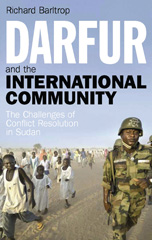2010 - Tauris
E-book
Versione Digitale
Lettura Online | NO Download | NO Copia/incolla | NO Stampa
Darfur and the International Community
272 p.
- Darfur has become synonymous with suffering. A vast, remote and poor region, Darfur has been torn by armed conflict and humanitarian crises, and haunted by the spectres of ethnic cleansing and genocide. After it broke onto the international stage in 2004 and grew into one of the world's worst humanitarian crises, the Darfur conflict presented the international community with dramatic challenges. How could the international community stop the fighting in Darfur? How could it save lives and help the two million people displaced by the conflict? And how could the international community - or those who wanted to act - bring about peace in Darfur and at the same time ensure that the Comprehensive Peace Agreement for the wider war between 1983 and 2005 was implemented? Here, Richard Barltrop draws on original research inside and outside Sudan, including extensive interviews with Sudanese and others who have been involved in Sudan's conflicts, politics and peace talks since 1983 and before, and official Sudanese and
- international sources. Tracing the history of international responses to the conflicts in Sudan, Barltrop investigates what determined the outcomes of international mediation and relief in Sudan. He shows that Darfur must be seen within the wider pattern of conflict in Sudan, and that both Sudan and the international community have missed opportunities to respond more effectively to the fundamental drivers of conflict in the country. As he explains, lessons should be drawn from this for Sudan and for the practice of conflict resolution elsewhere in the world today and in the future. This ground-breaking and insightful book offers crucial analysis for policymakers, mediators and humanitarian and development workers, as well as students and general readers who wish to deepen their understanding of Africa's largest country and the major political and humanitarian challenges it has posed for the international community. [Publisher's text].
- Special access authorizations may apply; please contact us for further information.
-
Informazioni


